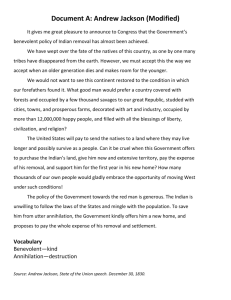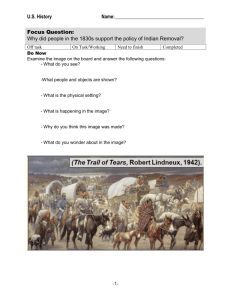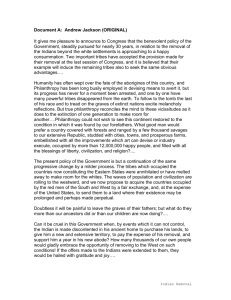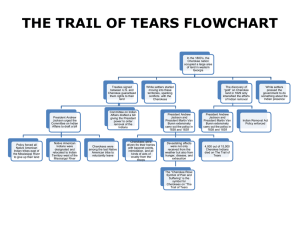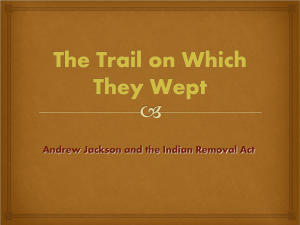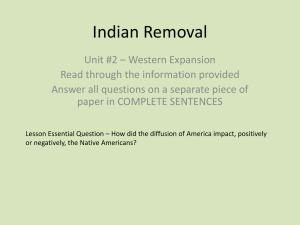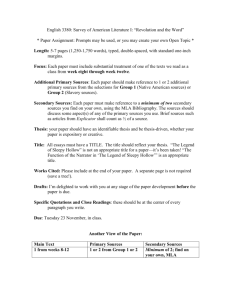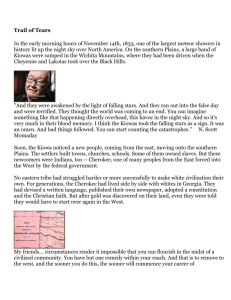Indian Removal: Jackson & Boudinot - Primary Source Analysis
advertisement
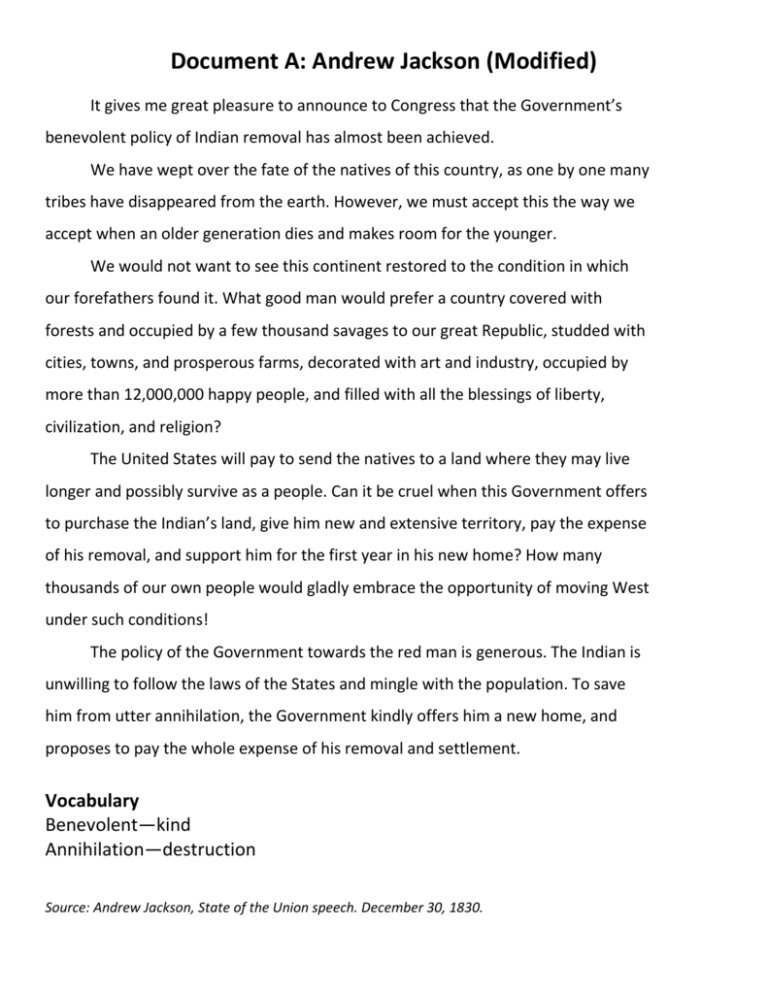
Document A: Andrew Jackson (Modified) It gives me great pleasure to announce to Congress that the Government’s benevolent policy of Indian removal has almost been achieved. We have wept over the fate of the natives of this country, as one by one many tribes have disappeared from the earth. However, we must accept this the way we accept when an older generation dies and makes room for the younger. We would not want to see this continent restored to the condition in which our forefathers found it. What good man would prefer a country covered with forests and occupied by a few thousand savages to our great Republic, studded with cities, towns, and prosperous farms, decorated with art and industry, occupied by more than 12,000,000 happy people, and filled with all the blessings of liberty, civilization, and religion? The United States will pay to send the natives to a land where they may live longer and possibly survive as a people. Can it be cruel when this Government offers to purchase the Indian’s land, give him new and extensive territory, pay the expense of his removal, and support him for the first year in his new home? How many thousands of our own people would gladly embrace the opportunity of moving West under such conditions! The policy of the Government towards the red man is generous. The Indian is unwilling to follow the laws of the States and mingle with the population. To save him from utter annihilation, the Government kindly offers him a new home, and proposes to pay the whole expense of his removal and settlement. Vocabulary Benevolent—kind Annihilation—destruction Source: Andrew Jackson, State of the Union speech. December 30, 1830. Document B: Letter by Elias Boudinot (Modified) Look at our people! They are wretched! Look, my dear sir, around you, and see the progress that vice and immorality have already made! See the misery! If the darker picture which I have described here is a true one, can we see a brighter possibility ahead? In another country, and under other circumstances, there is a better prospect. Removal, then, is the only remedy, the only practical remedy. Our people may finally rise from their very ashes, to become prosperous and happy, and a credit to our race. I would say to my countrymen, fly from your life here that is destroying our nation. What is your (John Ross) plan of relief? It is dark and gloomy beyond description. You want the Cherokee to live according the laws of Georgia, no matter how unfair they are? Instead of fix the evil, you would tie our people down in the chains of slavery. The final destiny of our race, under such circumstances is too revolting to think of. Take my word, it is the sure end of our race if you succeed in preventing the removal of your people. There will come a time when there will be few of us left as reminders of this brave and noble race. May God protect us from such a destiny. Vocabulary wretched—miserable vice—sin prospect—possibility Source: The letter above was written in 1837 by Elias Boudinot, a Cherokee who supported Indian Removal (and who signed the Treaty of New Echota that gave away Cherokee land). The letter is to Chief John Ross, leader of the Cherokees who opposed Indian Removal. Name: ___________KEY________________________________ Period: _______ Indian Removal Primary Source Investigation Document A: Andrew Jackson 1. Before you read: What do you already know about Andrew Jackson’s feelings about Indian Removal? What do you predict he will say about it? Answers will vary - students should know that Andrew Jackson was in support of Indian Removal 2. Why does Andrew Jackson feel the United States was better in 1830 than it was in 1609? The US is better in 1830 than in 1609 because it is full of cities, towns & prosperous farms; decorated with art & industry; occupied with more than 12, 000,000 happy people; filled with liberty, civilization & religion 3. Why does Jackson feel the Cherokee will be better off in Indian territory? They will be able to live longer and survive as a people 4. Why does Jackson think his plan is kind and generous? Jackson believes his plan is kind & generous because the government is offering the natives new territory, paying expenses of the removal, and support the natives for their first year in their new territory. Write your own questions about the documents, choosing a question starter from the list provided for each. 5. Who-What-Where-When Question: Answer: Document B: Elias Boudinot 1. Before you read: Elias is a Cherokee. How do you predict he would feel about Jackson’s Indian Removal Policy? Answers will vary – students should already know that the Natives were against Jackson’s Indian Removal policy 2. What was life like for the Cherokee in Georgia, according to Boudinot? Life for the Cherokees in Georgia was very unpleasant (“misery”); dark and gloomy 3. What does Boudinot hope will happen if the Cherokees move west? Boudinot hopes that his people will be able to become prosperous & happy when they move west. Write your own questions about the documents, choosing a question starter from the list provided for each. 4. Rewrite-Connect-Critique-Prioritize-Defend-Compare Question: Answer: Group Member Names______________________________________________________________________ Indian Removal Group Decision Map Use information from today’s class to complete the graphic organizer below. You MUST include facts from the timeline and/or readings! Reasons SUPPORTING Indian Removal Reasons OPPOSING Indian Removal Ultimately, our group has decided that the best solution to the “Indian Problem” is… Give Specific Reasons!
